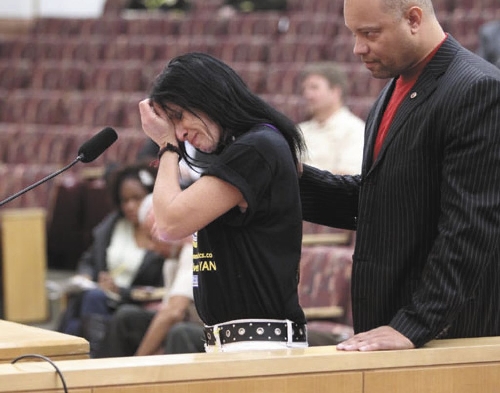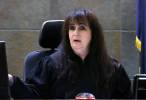Clark County commissioners consider alternative to inquests in police shootings
The coroner's inquest process could face the most significant change in its four-decade history if Clark County commissioners next month adopt a proposal from two of their own and Sheriff Doug Gillespie.
The change, pitched by commissioners Steve Sisolak and Larry Brown, would be similar to the new inquest code. But it would not be called an inquest, would not have a panel of citizens tasked with answering a list of factual questions, would not be in a courtroom and would not include the testimony of witnesses or officers.
In short, it would be a public hearing where two or three people - the department's lead investigator into the death, the prosecutor who ruled the death legal and possibly the medical examiner who performed the autopsy - would answer questions about the incident before a district attorney, an ombudsman representing the family and a hearing master.
The venue would be the County Commission chambers.
The idea was introduced during the commission's Tuesday meeting, where commissioner Chris Giunchigliani was pushing to make a small change to the county code that would revive the inquest process, which is backlogged with roughly 20 cases dating to 2011.
Brown said the idea is to have some kind of public procedure so that families of the deceased can learn what caused their loved ones' death at the hands of police.
"Somewhere along the line, we raised the expectation of what this inquest process was supposed to accomplish," Brown said. "It's not a matter of guilt or innocence; it's a matter of finding out what happened."
The quasi-legal inquest process has always known controversy since its introduction in 1969. But when commissioners in 2011 adopted changes that eliminated juries who ruled officers' actions justified, excusable or criminal and added an ombudsman who could cross-examine witnesses, police filed lawsuits against the inquest, and it has been stalled since. Officers have said they won't participate in future inquests.
Giunchigliani wants to jump-start the process again and was critical of the new proposal. The new inquest process hasn't yet been tried.
"We're being asked to fix something that isn't broken and hasn't even had an opportunity to be vetted," she said. "If it's not working the way everybody envisioned, then we go back to the drawing table."
Her skepticism was echoed by representatives from the American Civil Liberties Union of Nevada and the NAACP of Las Vegas.
"What's better, the people who talk to the eyewitnesses, or the eyewitnesses themselves?" ACLU of Nevada general counsel Allen Lichtenstein said afterward.
The detective's presentation at the proposed hearing would be based on their investigative file, which would include witness statements and other evidence.
Picture and video evidence would be presented at the hearing.
But the hearing wouldn't include participation by civilians or other officers. Officers still won't participate in the proposed process, said Chris Collins, executive director of the Las Vegas Police Protective Association, which represents the Metropolitan Police Department's rank-and-file cops.
Commissioners will be able to vote on the competing proposals in January.
Either option would still provide unusual public disclosure for police uses of deadly force. Seattle is the only major city that has some kind of public hearing for deadly police interactions, but counties in California, Montana, Illinois and Pennsylvania all carry out inquests.
Most cities have a district attorney, in private, make a decision about whether a police shooting was legal. Since Clark County District Attorney Steve Wolfson took over this year, he has issued public statements explaining his decisions, and police are releasing their investigative reports into shootings afterward.
When commissioners made changes to the inquest process two years ago, they modeled the revised inquest after the one in Seattle, where a panel of citizens hears testimony and answers a list of pre-arranged questions, such as whether the person who was killed did something to provoke officers.
Lichtenstein said removing that inquest panel would not be a significant issue.
Both Gillespie and Sisolak said any process would have to stop being called an "inquest," a word that has a negative connotation for some.
Commissioners heard an hour of public comments from interest groups and citizens, including three family members of people shot and killed by Las Vegas police, urging them to resume the inquest process.
Rondha Gibson, the widow of Gulf War veteran Stanley Gibson, said, "I want it brought back," before tears prevented her from speaking further. Her husband was killed in December 2011 by a Las Vegas officer. Stanley Gibson was disabled and believed to have been confused when his car was penned in by two police cruisers and an officer shot at him seven times.
Alma Chavez's son, Rafael "Ralfy" Olivas, was shot by officers in July 2011 after he emerged from a home with a knife. Officers fired four beanbag shotgun rounds at Olivas, 23, which didn't stop him. He continued toward police and was fatally shot by the two officers.
"I don't have the dreams I had before," Chavez told commissioners. "I don't have faith in Metro, and I would like to recover the faith in Metro because I know there's good people there. ... I please beg you to push the coroner's inquest forward."
Brown said the purpose of any process should center on the families seeking answers to why their loved ones were killed by police. But it's not supposed to find guilt, which, for decades, was its purpose.
"I don't want us to raise the expectation that this would find guilt or innocence," Brown said. "There's still a sense today that, 'We've got to get 'em.' And this is not the venue."
Wolfson said his office would participate no matter what model the commission chooses.
"It is our job to get the facts out to this community in whatever fashion you folks come up with," Wolfson said. "We will be there."
Contact reporter Lawrence Mower at lmower@reviewjournal.com or 702-405-9781.
Deadly Force: When Las Vegas Police Shoot, and Kill
Las Vegas Review-Journal investigative series






























